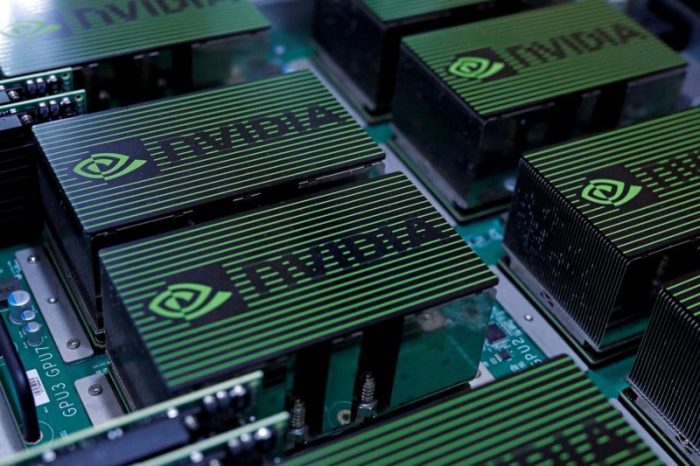Washington’s move to ban exports of two advanced chips to China is likely to affect most major tech companies running public cloud services or artificial intelligence training modules, experts said on Thursday.
China voiced its opposition to the move on Thursday after Nvidia revealed the news on Wednesday (US time). The California-based chip designer said US officials told it to stop exporting two top computing chips to China that are used for artificial intelligence work.
Advanced Micro Devices also said it had received new licence requirements that will stop its advanced AI chip called MI250 from being exported to China.
Shu Jueting, a Chinese Commerce Ministry spokesperson, told a regular press conference that Beijing opposes the measures, saying they undermine the rights of Chinese companies and threaten to disrupt global supply chains.
The orders underscore deepening US-China tensions over access to advanced chip technology.
“We’re going from blocking certain US companies from supplying to a certain company, as was the case with Huawei, to banning certain US products from selling to China period,” Jay Goldberg, CEO of D2D Advisory, a finance and strategy consulting firm, said.
The worst-case scenario would be Washington broadening the ban to block contract chipmakers such as Taiwan Semiconductor Manufacturing Co and Samsung from making chips for Chinese chip designers, Jefferies’ analysts said in a note.
“We are not there yet, and the US will likely evaluate the effectiveness of each incremental step before drastic action is considered,” it said.
Market watchers say the latest ban is likely to hit a swathe of Chinese tech companies including giants such as Alibaba Group, Tencent Holdings, Baidu, and Huawei Technologies.
ALSO SEE: US Orders Nvidia to Stop Sale of Advanced Chips to China
Exports of AI Chips Allowed for a Year: Nvidia
However, Nvidia said on Thursday Washington had allowed exports and in-country transfers needed to develop the company’s H100 artificial intelligence chip.
The government authorised Nvidia to fulfill orders of the A100 and H100 AI chips via its Hong Kong facility up till September 1, 2023, it said.
The ban, which affects its A100 and H100 chips designed to speed up machine learning tasks, could interfere with the development of the H100, the flagship chip the company announced this year.
Financial Impact Envisaged
Jefferies added affected companies could either rely on cloud services from Alphabet’s Google or Amazon.com’s AWS to develop AI software and export it back to China, or use multiple lower-end chips to replicate the processing power of the banned, high-end chips.
One former senior staffer at AMD in China said that the restrictions won’t stop Chinese tech companies from advancing their AI research, but will make research more expensive and less efficient in the short-term.
“It’s a resource impact. They will still work on the same projects, they will still be moving forward, it just slows them down,” he said.
Alibaba, Tencent and Baidu did not immediately reply to requests for comment. Huawei declined to comment.
Useful for Military Purposes
The Nvidia and AMD chips targeted by Washington are used for AI and machine learning applications, particularly building training modules for tasks such as natural language processing.
These modules could be also be useful for militaries in modeling bomb simulations and designing weapons.
Goldberg at D2D said there are few Chinese companies that could offer chips to replace those of AMD and Nvidia quickly and the restrictions would likely spur more funding for domestic chip startups to narrow its gap with US firms.
China is home to a number of startups aspiring to make chips that can compete with Nvidia and AMD. Many were founded by former staffers of those companies, though few have attained meaningful scale.
Shares of Chinese Chipmakers Surge
Shares in Chinese AI chipmakers Hygon Information Technology Co and Loongson Technology Corp surged on Thursday, rising 10% and 6%, respectively.
Last week, Biren, a company founded by alumni of Nvidia and Alibaba, unveiled a 7nm chip that experts say marks notable progress for China’s chip sector.
“There are several dozen Chinese chip companies working on all flavors of AI accelerators, and their order books are going to fill up tomorrow,” Goldberg said.
- Reuters with additional editing by Jim Pollard
ALSO SEE:
Alibaba, JD.com Among First Chinese Firms Facing US Audits
New US Chip Curbs on China Would Risk More Supply Chain Woes
US Set to Limit Export of Chipmaking Gear to China Firms
US, Japan Chips Alliance Aims to Thwart China Ambitions
























